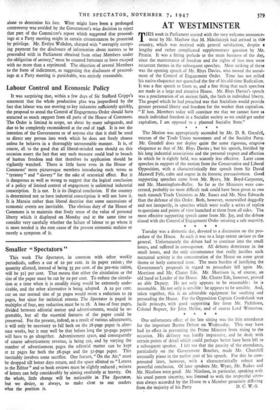Labour Control and Economic Policy
It was surprising that, within a few days of Sir Stafford Cripps's statement that the whole production plan was jeopardised by the fact that labour was not moving to key industries sufficiently quickly, the proposal to annul the Control of Engagements Order should have attracted so much support from all parts of the House of Commons. The Order is limited in scope, set about by many safeguards, and due to be completely reconsidered at the end of 1948. It is not the intention of the Government or of anyone else that it shall be used to direct any person into work which he does not freely choose unless he behaves in a thoroughly unreasonable manner. It is, of course, all to the good that all liberal-minded men should on this occasion assert the fact that any such measure could lead to breach of human freedom and that therefore its application should be vigilantly watched. There is little harm even in the House of Commons' more picturesque members introducing such terms as " tyranny " and " slavery " for the sake of oratorical effect. But it is dangerous as well as wrong to suggest that the logical conclusion of a policy of limited control of engagement is unlimited industrial conscription. It is not. It is its illogical conclusion. If the country is determined not to have industrial conscription it will not have it. It is Marxist rather than liberal doctrine that some successions of economic events are inevitable. The obvious duty of the House of Commons is to maintain that lively sense of the value of personal liberty which it displayed on Monday and at the same time to consider very carefully whether the failure of labour to go where it is most needed is the root cause of the present economic malaise or merely a symptom of it.


































 Previous page
Previous page